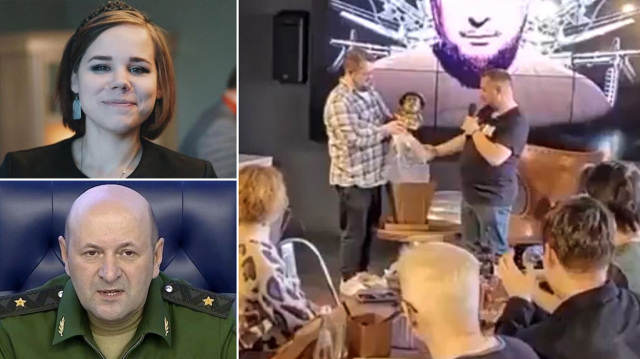Sure! Here’s a rewritten version of the content:
On the evening of December 16, 2024, the snow had ceased in Moscow, covering the sidewalks, including the affluent areas home to top Russian officials.
As Lieutenant General Igor Kirillov, leader of the Russian Nuclear, Biological, and Chemical Protection Troops, exited his apartment building on Ryazansky Avenue with his aide, he overlooked a small electric scooter parked just a short distance from his vehicle.
Before he could take more than a step, a fierce explosion claimed his life, along with that of his aide. A few hours later, a video capturing his last moments was leaked to the public by the SBU, Ukraine’s Security Service, which had just the day before labeled Kirillov as a war crimes suspect.
Few knew that the SBU had already made the decision to eliminate him, fully aware that the married general with two children had ordered the extensive use of prohibited chemical weapons in combat, resulting in 2,000 Ukrainian soldiers being hospitalized due to chemical exposure.
Strikes in the Heart of Moscow
Kirillov’s assassination sent shockwaves through the Kremlin, disturbing the leadership of Russia’s intelligence agencies, the FSB and GRU, whose role is to thwart such operations.
It was later disclosed that the abandoned scooter was packed with explosives, allegedly detonated remotely by an SBU operative, likely from a nearby car.
According to The Guardian, this marked a precise strike by the Ukrainian Security Service, which was deemed more spectacular than the subsequent drone assaults on five Russian military bases the prior Sunday.
However, it wasn’t an isolated incident. Since the start of Russia’s invasion of Ukraine, the SBU has executed multiple operations against perceived enemies. It began in August 2022, with the car explosion that killed Darya Dugina, the daughter of ultranationalist Alexander Dugin, a Putin supporter.
In April of the following year, Vladlen Tatarsky, a well-known pro-war military blogger who frequently visited a specific café in St. Petersburg, became a target. SBU agents rigged a gold statue with a bomb, which took his life instantly. Later, in December 2023, former Ukrainian MP Ilya Kiva was shot by an unknown assailant.
Kiva had defected to Moscow shortly before the war and appeared often on Russian state television, criticizing the Ukrainian government. He was walking through a park in the upscale suburb of Odintsovo when he was approached and executed with a firearm, his body found hours later.
Strategic Shift
In Ukraine, many refer to the SBU as “The Service of God,” an agency that has infiltrated deeply into Russia, a truth exemplified by Operation “Spiderweb.”
In the past two years, it seems the Ukrainian Security Service has altered its strategy. Following Kiva’s assassination, the focus shifted to individuals directly engaged in the war. “We decided to target the specialists,” an anonymous SBU official informed The Guardian last year after Kirillov’s killing.
This escalation in strategic focus led to actions like the attacks on the Crimean bridge and the audacious drone assault involving 117 drones on five military bases on June 1 of this year.
These highly classified operations could not have been executed without the cooperation of recruited Russians opposed to the war as well as SBU agents who have lived undercover in Russia, blending in until the time to act arises.
When orders come from the Sluzhba Bezpeky Ukrainy, the right operatives carry out dramatic missions like “Spiderweb” or administer their own brutal justice to Russian generals using booby-trapped scooters.
Feel free to ask if you need any alterations or additional details!

















